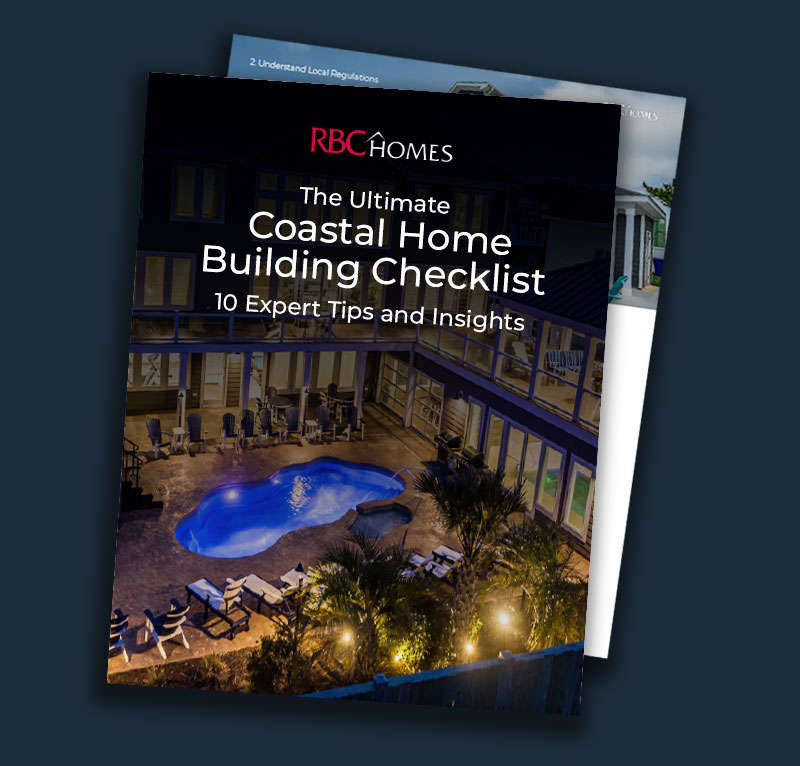Best Neighborhoods in Virginia Beach VA – Top 8 Areas
Looking for the best neighborhoods in Virginia Beach VA? From oceanfront escapes to quiet family communities, this city offers something for every lifestyle. Whether you’re relocating or building your dream home, we’ll help you find the perfect place to call home.
So, What Are the Best Neighborhoods in Virginia Beach VA?
Here are the 8 best neighborhoods in Virginia Beach VA:
Read on to explore what makes each neighborhood stand out — from home prices and safety to lifestyle and amenities — and why they’re ideal for custom home living with RBC Homes.
1. Linkhorn Estates
The top-ranked luxury neighborhood in Virginia Beach, Linkhorn Estates combines exclusivity, elegance, and coastal charm in one of the city’s most coveted settings.
- Home Prices and Market Trends: Homes in Linkhorn Estates typically range from $1 million to $4 million, with a stable market reflecting high demand for luxury properties.
- Safety: The neighborhood enjoys a low crime rate, enhanced by private security and vigilant community watch programs.
- Environmental Quality: Linkhorn Estates is known for its pristine natural environment, with well-maintained landscapes and clean, serene surroundings.
- Amenities and Services: Residents have access to elite golf courses, private boat docks, and exclusive club memberships, making it a haven for luxury and leisure.
- Community and Lifestyle: The community is tight-knit, with affluent residents who value privacy and a high standard of living. Social events and neighborhood gatherings foster a strong sense of belonging.
As a benchmark for high-end living in Virginia Beach, Linkhorn Estates offers an unmatched combination of prestige, privacy, and lifestyle for discerning homeowners.
2. Bay Colony
Bay Colony stands out among the best neighborhoods in Virginia Beach VA, offering quiet wealth and coastal access. With gated streets and a no-flash attitude, it attracts homeowners who want luxury without the noise.
- Home Prices and Market Trends: Bay Colony homes range from $1.5 million to $5 million, with a consistently appreciating market due to its prime location and luxury appeal.
- Safety: Bay Colony is one of the safest neighborhoods in Virginia Beach, featuring gated entrances and dedicated private security patrols.
- Environmental Quality: The area is celebrated for its lush, landscaped properties and private beaches, offering a peaceful and picturesque setting.
- Amenities and Services: Residents enjoy private beach access, tennis courts, and proximity to high-end shopping and dining options, enhancing the luxury lifestyle.
- Community and Lifestyle: Bay Colony is a community of discerning individuals who enjoy exclusive living with a strong emphasis on privacy and elegance. Social clubs and events provide opportunities for networking and fostering close community ties.
There’s no need to show off when everything speaks for itself. Bay Colony delivers premium living with minimal pretense — just space, seclusion, and the ocean minutes away.
3. Alanton
Appealing to families and multigenerational households, Alanton blends historic charm with modern comforts, featuring tree-lined streets and access to waterfront parks like First Landing State Park.
- Home Prices and Market Trends: Alanton features homes ranging from $400,000 to $1.2 million, with a steady market due to its family-friendly appeal.
- Safety: The neighborhood is known for its low crime rate and active neighborhood watch programs, ensuring a secure environment for families.
- Environmental Quality: Alanton boasts lush green spaces, well-maintained parks, and tree-lined streets, offering a peaceful and inviting atmosphere.
- Amenities and Services: In addition to top-rated schools, families in Alanton enjoy access to recreational centers and a variety of sports facilities. Moreover, the neighborhood provides convenient shopping and dining options.
- Community and Lifestyle: Alanton is characterized by a strong sense of community, with numerous events and activities geared towards families. The friendly, welcoming atmosphere makes it an ideal place for children to grow and thrive.
For active families seeking a safe, scenic setting with excellent schools and a true neighborhood feel, Alanton stands out as a top choice in Virginia Beach.
4. Kempsville
A long-established suburban hub of Virginia Beach, Kempsville offers accessible, family-oriented living with diverse housing options and essential amenities close at hand.
- Home Prices and Market Trends: Homes in Kempsville range from $300,000 to $800,000, with a diverse selection to fit different family needs and budgets.
- Safety: Kempsville is a safe neighborhood with a proactive community policing program, making it a reassuring choice for families.
- Environmental Quality: The area features numerous parks, playgrounds, and walking trails, ensuring plenty of opportunities for outdoor activities and family recreation.
- Amenities and Services: Along with excellent schools, residents of Kempsville benefit from libraries and family-focused community centers. Additionally, the neighborhood offers easy access to medical facilities and essential services.
- Community and Lifestyle: Kempsville fosters a family-oriented lifestyle with a variety of community events, youth programs, and sports leagues. The close-knit community spirit is evident in the active participation of residents in local activities.
For families seeking a vibrant, well-rounded community with solid schools, convenient amenities, and reliable market stability, Kempsville is a top-tier choice in Virginia Beach.
5. Sandbridge
Known as Virginia Beach’s quiet coastal escape, Sandbridge is a secluded stretch of shoreline south of the main resort strip, ideal for those who value peace, space, and scenic ocean views.
- Home Prices and Market Trends: Homes in Sandbridge range from $700,000 to over $2 million, with a strong market driven by the demand for beachfront properties.
- Safety: Sandbridge is known for its safe, tranquil environment, making it a haven for those seeking peace and security by the sea.
- Environmental Quality: The neighborhood is celebrated for its pristine beaches, clean air, and well-preserved natural surroundings, providing a serene and picturesque setting.
- Amenities and Services: Residents of Sandbridge enjoy access to beautiful beaches, water sports, and local seafood restaurants. The area also offers convenient access to shops and essential services.
- Community and Lifestyle: Sandbridge is a close-knit community with a relaxed, laid-back lifestyle. Residents often engage in beach activities, community events, and outdoor adventures, fostering a strong sense of camaraderie and connection.
For those drawn to a quieter, more nature-connected way of life, Sandbridge offers a unique lifestyle that ranks it among the best neighborhoods in Virginia Beach VA—blending beachfront beauty, privacy, and small-community warmth.
6. Oceanfront
If you’re looking for front-row access to Virginia Beach’s most iconic attractions, Oceanfront delivers. This lively neighborhood blends coastal living with nonstop entertainment, making it a favorite for residents who want to be part of the action.
- Home Prices and Market Trends: Oceanfront properties range from $500,000 to over $3 million, with a vibrant market reflecting the high desirability of oceanfront living.
- Safety: The Oceanfront area maintains a safe environment with regular patrols and a strong focus on community safety measures.
- Environmental Quality: Known for its iconic boardwalk and clean, sandy beaches, Oceanfront offers a vibrant and lively atmosphere with excellent environmental quality.
- Amenities and Services: Oceanfront residents benefit from a wide range of amenities, including beachfront dining, entertainment venues, and recreational activities. The area also provides easy access to shopping centers and cultural attractions.
- Community and Lifestyle: The lifestyle in Oceanfront is dynamic and active, with a focus on enjoying the coastal environment. From festivals and events to beach sports and leisurely walks on the boardwalk, there’s always something to do and enjoy.
From morning coffee with a view to weekends filled with live music and outdoor fun, Oceanfront offers a high-energy, sun-soaked lifestyle that truly captures the spirit of Virginia Beach.
7. North End
Tucked away from the city’s busier areas, North End offers the kind of peace and privacy that defines the best neighborhoods in Virginia Beach VA. With its residential charm and easy beach access, it’s ideal for those craving a slower, more scenic coastal lifestyle.
- Home Prices and Market Trends: Properties in North End typically range from $800,000 to $2.5 million, with demand fueled by its quiet charm and coastal location.
- Safety: North End is considered one of Virginia Beach’s most secure areas, known for its peaceful streets and active community involvement.
- Environmental Quality: Renowned for its quiet shoreline, lush greenery, and lack of commercial congestion, North End provides a naturally tranquil setting.
- Amenities and Services: Locals enjoy private beach access, scenic trails for biking and walking, and nearby parks. Daily conveniences and dining are close at hand, yet the neighborhood retains its peaceful character.
- Community and Lifestyle: With a relaxed, easygoing atmosphere and a strong neighborly spirit, North End is perfect for those who want a calm coastal lifestyle in a close-knit, welcoming community.
For those seeking a more private and refined coastal lifestyle, North End offers classic charm, a close-knit community, and understated elegance—making it one of Virginia Beach’s most distinguished neighborhoods.
8. Great Neck
Known for its central location and strong schools, Great Neck is a versatile, well-established neighborhood that appeals to a broad mix of families, professionals, and retirees. With easy access to parks, shopping, and the beach, it offers convenience without sacrificing charm.
- Home Prices and Market Trends: Depending on the subdivision, homes in Great Neck typically range from $350,000 to over $1 million. Thanks to its stability, the area remains a popular choice for both move-up buyers and downsizers.
- Safety: Great Neck is considered a safe, family-friendly neighborhood with strong community involvement and consistently low crime rates.
- Environmental Quality: Residents enjoy tree-lined streets, access to nearby Lynnhaven River and Great Neck Park, and well-kept neighborhoods that reflect long-term pride of ownership.
- Amenities and Services: Great Neck offers a wealth of nearby conveniences—top-rated public and private schools, fitness centers, libraries, shopping centers like Hilltop, and quick access to Shore Drive and the Oceanfront.
- Community and Lifestyle: With a mix of generations and housing styles, the area has a friendly, active feel. Community events, youth sports, and easy access to schools and services create a balanced, neighborly lifestyle.
For its blend of location, livability, and family appeal, Great Neck earns its place among the best neighborhoods in Virginia Beach VA—especially for those who want convenience, quality schools, and a strong sense of community.
Building Your Dream Home in Virginia Beach
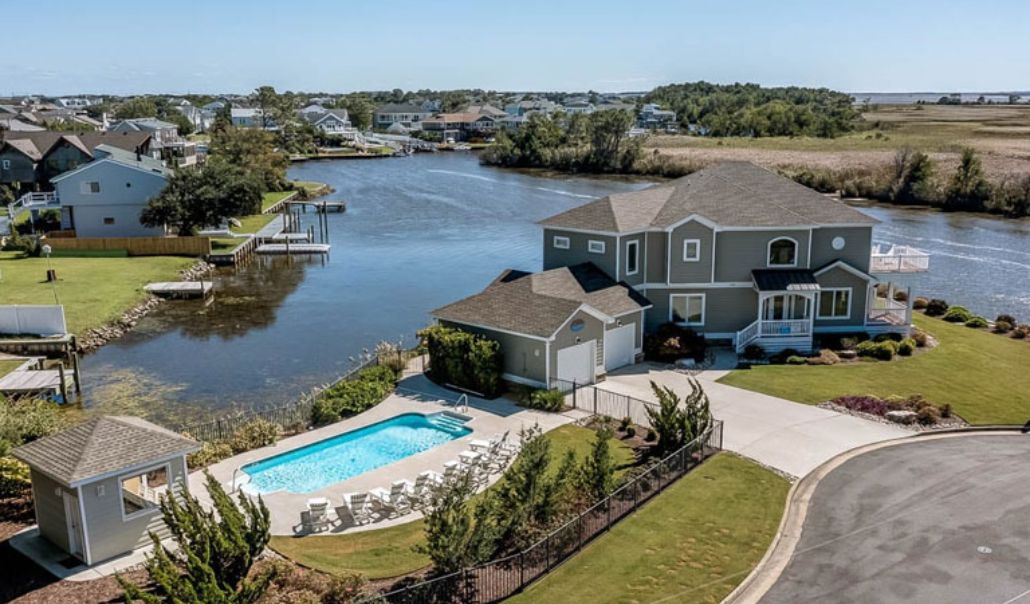
Choosing to build a custom home in Virginia Beach offers numerous benefits that cater to your unique needs and lifestyle.
A custom-built home allows you to personalize every aspect of your living space, from the layout and design to the finest details, ensuring that your home truly reflects your vision and preferences.
The Benefits of a Custom-Built Home
A custom-built home offers:
- Personalization of every detail, from layout to design.
- High-quality construction tailored to your preferences.
- Integration of the latest technology and energy-efficient features.
- Enhanced functionality and comfort designed specifically for your needs.
Finding the Perfect Neighborhood
RBC Homes is dedicated to helping clients find the best neighborhoods in Virginia Beach, VA, and build their dream home.
Our team of experts has extensive knowledge of the local market and can guide you in selecting a neighborhood that aligns with your lifestyle. Whether you’re looking for luxury, family-friendly, or beachfront living, we have you covered.
Read More: Retirement in Virginia Beach VA – 8 Benefits to Know
RBC Homes Expertise
Our expertise in designing and building luxury homes ensures that your new home will not only meet but exceed your expectations.
We pay meticulous attention to every detail, ensuring that your home is tailored to the specific aesthetics and characteristics of your chosen neighborhood.
From the initial design phase to the final construction, RBC Homes is committed to delivering exceptional quality, craftsmanship, and customer satisfaction.
With RBC Homes, you can rest assured that your custom home will be a masterpiece that combines your personal style with the unique charm and beauty of Virginia Beach’s best neighborhoods.
Let us help you turn your dream of a perfect home into a reality.
Case Studies
RBC Homes has a proven track record of creating luxurious, custom-built homes that meet the highest standards of quality and craftsmanship.
A license to Chill
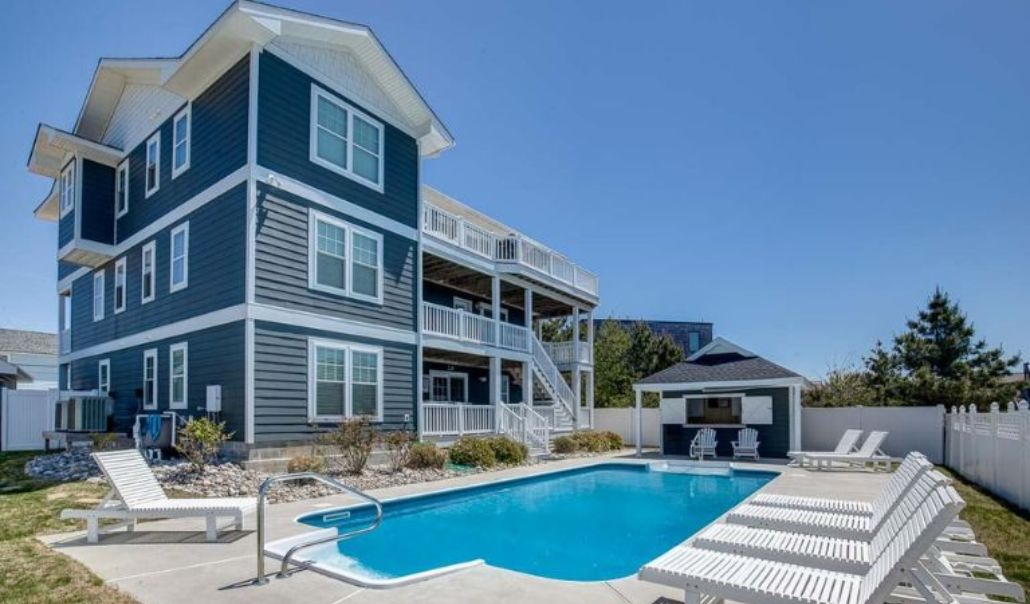
RBC Homes showcases its expertise with “A License to Chill,” a custom-built luxury home featuring elegant decor, custom cabinets, granite countertops, and extensive decks.
Just steps from the beach, it includes a private pool, cabana bar, and spacious entertainment areas.
This project highlights RBC’s commitment to quality, craftsmanship, and customer satisfaction.
Bellissimo
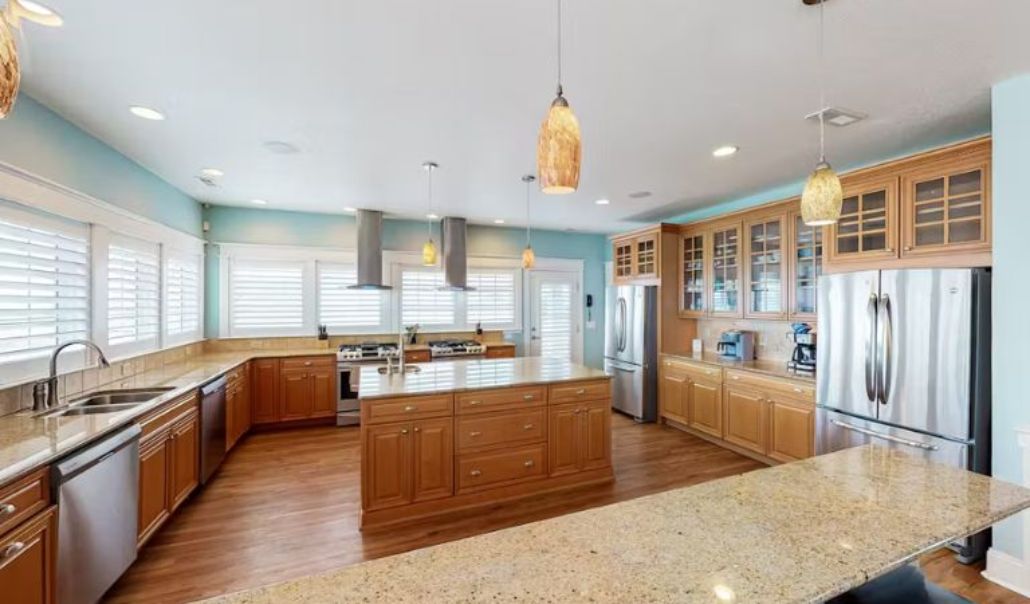
“Bellissimo” is a nine-bedroom oceanfront sanctuary in Sandbridge, crafted by RBC Homes.
This luxury home features a private pool with tempered-glass fencing, a two-story gazebo, a hot tub, a game room, and direct beach access.
The state-of-the-art home theater, gourmet kitchen with dual appliances, and bedrooms with private balconies showcase RBC’s commitment to quality, craftsmanship, and customer satisfaction.
Over the Moon
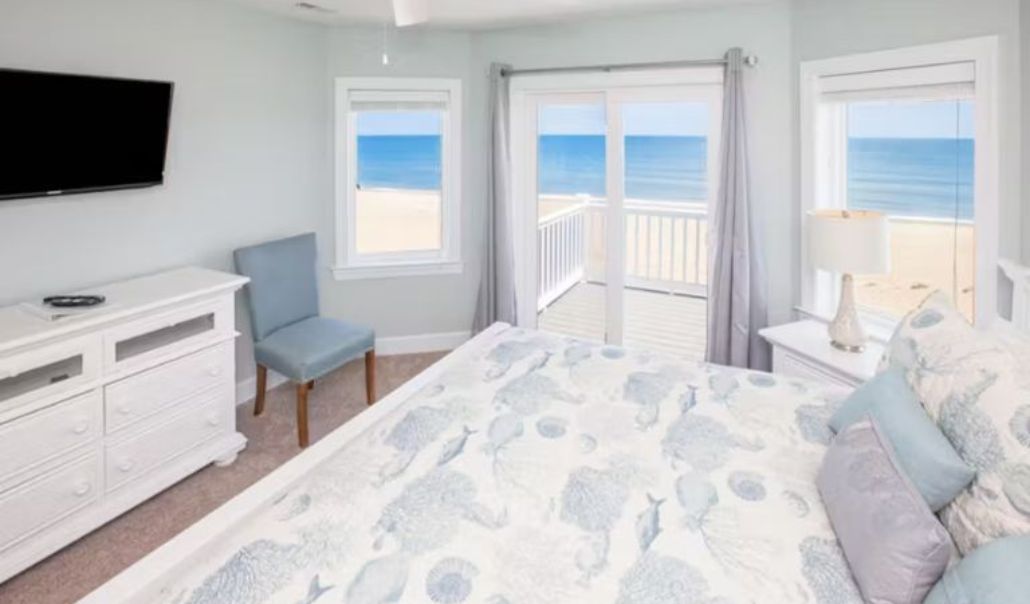
“Over the Moon” is an oceanfront luxury retreat with nine bedrooms and eight en-suite baths across three floors.
This custom-built home by RBC Homes features an elevator for easy access, expansive decks with ocean views, a private pool, hot tub, game room, and a private movie theater.
Designed for ultimate comfort and entertainment, “Over the Moon” exemplifies RBC’s commitment to quality, craftsmanship, and customer satisfaction.
FAQs
The best side of Virginia Beach depends on your preferences. The North End offers quiet, residential areas with easy beach access, while the Oceanfront is vibrant and bustling with activities and entertainment.
Bay Colony is considered one of the richest neighborhoods in Virginia Beach, known for its luxurious homes, private beach access, and upscale amenities.
Linkhorn Estates and Alanton are among the safest neighborhoods in Virginia Beach, with low crime rates and strong community watch programs.
Sandbridge is known for its peaceful, secluded atmosphere, making it one of the quietest parts of Virginia Beach.
Yes, you can build your own home in Virginia. RBC Homes specializes in custom home construction, helping clients design and build their dream homes. Learn more about building your own home in Virginia Beach.
The timeline for building a custom home in Virginia varies based on the complexity of the design and permitting process but generally takes between 8 to 12 months. Learn more about the custom home building timeline.
Do you have more questions?
If you have more questions or need assistance, contact RBC Homes today to start your journey toward building your dream home in Virginia Beach.
Conclusion
Virginia Beach offers diverse neighborhoods, from luxurious Linkhorn Estates and Bay Colony to family-friendly Alanton and Kempsville.
Additionally, there are serene beachfront areas like Sandbridge and Oceanfront.
Each community has its unique charm, ensuring a perfect fit for everyone. RBC Homes is here to assist you in finding the best neighborhoods in Virginia Beach, VA, and building your dream home.
With our expertise in luxury custom home construction, we seamlessly integrate your lifestyle into your new home.
Contact us today to start your journey!





